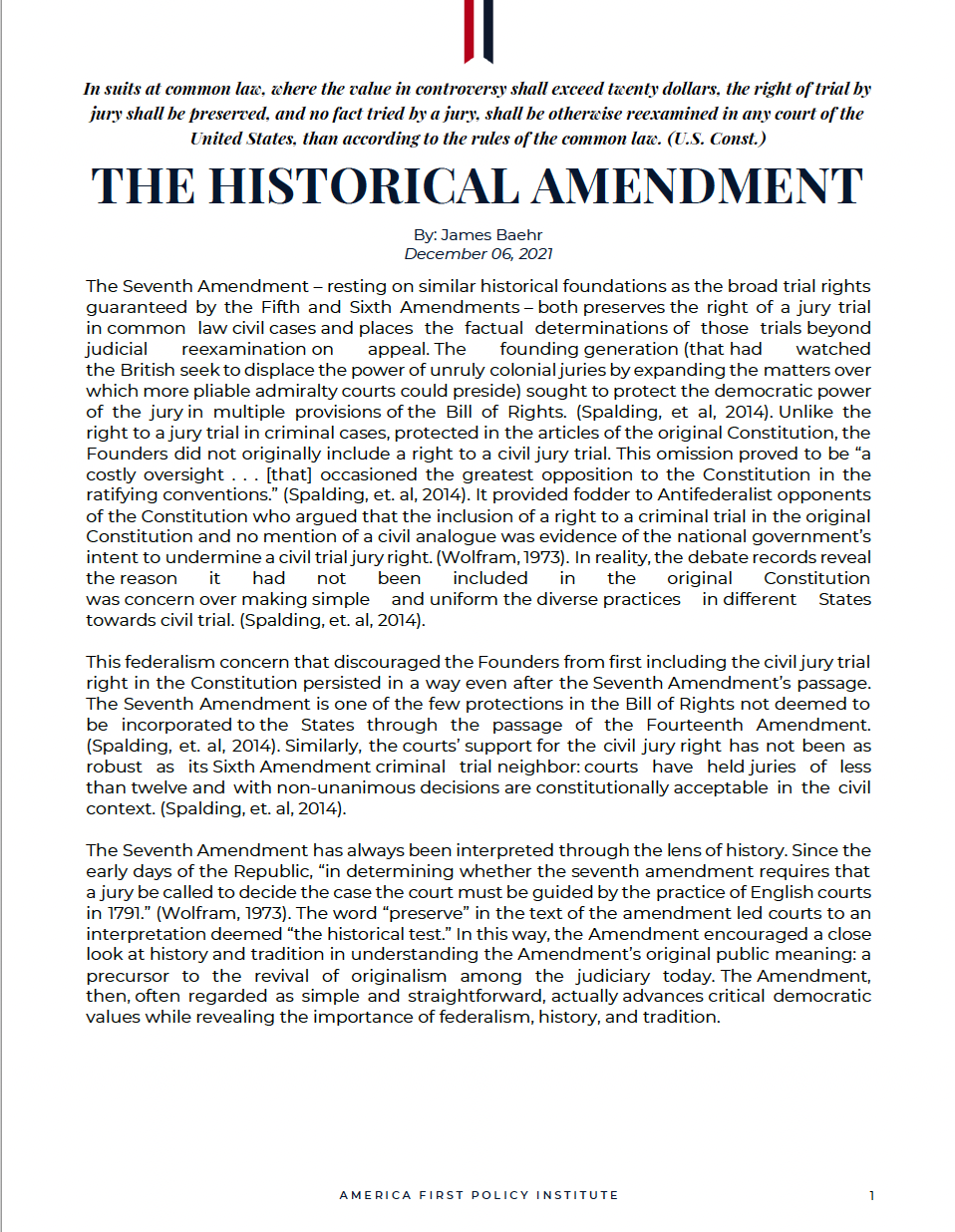The Historical Amendment
In suits at common law, where the value in controversy shall exceed twenty dollars, the right of trial by jury shall be preserved, and no fact tried by a jury, shall be otherwise reexamined in any court of the United States, than according to the rules of the common law. (U.S. Const.)
The Seventh Amendment – resting on similar historical foundations as the broad trial rights guaranteed by the Fifth and Sixth Amendments – both preserves the right of a jury trial in common law civil cases and places the factual determinations of those trials beyond judicial reexamination on appeal. The founding generation (that had watched the British seek to displace the power of unruly colonial juries by expanding the matters over which more pliable admiralty courts could preside) sought to protect the democratic power of the jury in multiple provisions of the Bill of Rights. (Spalding, et al, 2014). Unlike the right to a jury trial in criminal cases, protected in the articles of the original Constitution, the Founders did not originally include a right to a civil jury trial. This omission proved to be “a costly oversight . . . [that] occasioned the greatest opposition to the Constitution in the ratifying conventions.” (Spalding, et. al, 2014). It provided fodder to Antifederalist opponents of the Constitution who argued that the inclusion of a right to a criminal trial in the original Constitution and no mention of a civil analogue was evidence of the national government’s intent to undermine a civil trial jury right. (Wolfram, 1973). In reality, the debate records reveal the reason it had not been included in the original Constitution was concern over making simple and uniform the diverse practices in different States towards civil trial. (Spalding, et. al, 2014).
This federalism concern that discouraged the Founders from first including the civil jury trial right in the Constitution persisted in a way even after the Seventh Amendment’s passage. The Seventh Amendment is one of the few protections in the Bill of Rights not deemed to be incorporated to the States through the passage of the Fourteenth Amendment. (Spalding, et. al, 2014). Similarly, the courts’ support for the civil jury right has not been as robust as its Sixth Amendment criminal trial neighbor: courts have held juries of less than twelve and with non-unanimous decisions are constitutionally acceptable in the civil context. (Spalding, et. al, 2014).
The Seventh Amendment has always been interpreted through the lens of history. Since the early days of the Republic, “in determining whether the seventh amendment requires that a jury be called to decide the case the court must be guided by the practice of English courts in 1791.” (Wolfram, 1973). The word “preserve” in the text of the amendment led courts to an interpretation deemed “the historical test.” In this way, the Amendment encouraged a close look at history and tradition in understanding the Amendment’s original public meaning: a precursor to the revival of originalism among the judiciary today. The Amendment, then, often regarded as simple and straightforward, actually advances critical democratic values while revealing the importance of federalism, history, and tradition.
AUTHOR BIOGRAPHY
James Baehr is a Senior Fellow of the America First Policy Institute. He is a Major in the Marine Corps Reserve and served as a Special Assistant to the President.
WORKS CITED
U.S. Const. amend. VII
Spalding, M. & Forte, D. (Eds.). (2014). The Heritage guide to the Constitution. Regnery Publishing.
Wolfram, Charles. (1973). The constitutional history of the Seventh Amendment. Minnesota Law Review, 639. https://scholarship.law.umn.edu/cgi/viewcontent.cgi?article=2023&context=mlr
